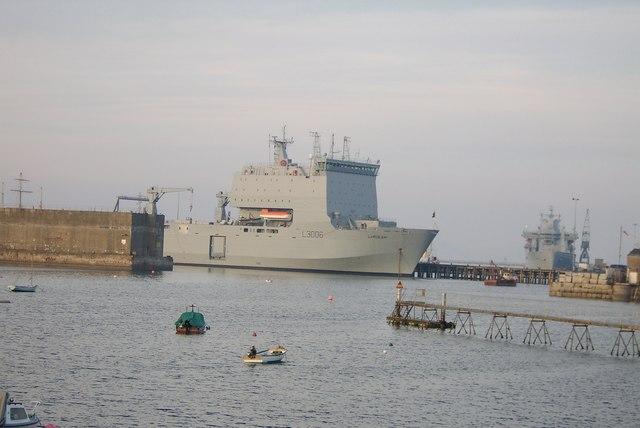
On 14 December 1944, the Royal Australian Fleet Auxiliary freighting tanker Bishopdale was in the Philippines in San Pedro Bay refuelling Australian and Allied forces when it was attacked by a Japanese kamikaze aircraft. Able Seaman Gunner Stuart Savage opened fire but, despite the efforts of the defensively equipped merchant ship’s gunnery team, the dive bomber hit the forward mast and then struck the bridge, causing significant damage and fatally wounding Savage and two of his shipmates.
The story of the Bishopdale and the fleet auxiliary is little known, but perhaps it’s time to reinvigorate the construct to support the future Royal Australian Navy.
Australia hopes for peace, but it cannot be blind to the need to prepare for the possibility of conflict. The 2023 defence strategic review stated:
[F]or the first time in 80 years, we must go back to fundamentals, to take a first-principles approach as to how we manage and seek to avoid the highest level of strategic risk we now face as a nation: the prospect of major conflict in the region that directly threatens our national interest.
That’s a stark warning that a major conflict could commence in our region with little to no time for preparation. In ASPI’s 2023–24 defence budget brief, I identified gathering the necessary workforce as the greatest risk to the Australian Defence Force’s future planning. That sentiment is highlighted in the DSR, which acknowledges the workforce issues and notes that the RAN ‘faces the most significant challenges of the three services’.
Defence’s 2023–24 budget gave the size of the RAN in 2022–23 as 15,253 personnel with a goal of 16,980 by 2025–26. However, the navy was already 495 personnel lower than forecast in the 2022–23 budget. Despite the best recruitment and retention aspirations, it is unlikely that the ADF and the RAN will reach the workforce growth target set in March 2022. Yet the future RAN will need more submariners to support the growth in crews required by the AUKUS nuclear-powered submarines and the potential growth required in surface vessel crews pending the outcome of the surface combatant fleet review due in late September.
It’s clear that structural reform will be an essential part of preparing the ADF and the RAN for the risk of conflict outlined in the DSR and the establishment of a civilian-crewed fleet auxiliary could be a key part of this. The dramatic reduction in Australia’s merchant fleet over the past decade means that this alone won’t solve the RAN’s personnel challenges but, among other structural reforms, it may assist.
Both the UK and US operate naval fleet auxiliaries consisting of logistics and sea-lift vessels crewed by civilian mariners. The RAN’s auxiliary vessels, which include the supply ships HMAS Supply and Stalwart and the landing ship dock HMAS Choules, are crewed by uniformed naval members but could be converted to civilian crewing. In fact, when the Choules was purchased from the UK, it served with the Royal Fleet Auxiliary as RFA Largs Bay and was therefore operated by a civilian crew.
The crew of the Choules is 158, but as the Largs Bay the core crew would have been 60 to 70, half the number the RAN uses to operate the same vessel. While the core crew of an RFA Wave-class tanker used to replenish the Royal Navy fleet is approximately 80, the complement of the RAN replenishment vessels, the Supply class, is approximately 170. Of course, they are different classes of vessels so it’s not an easy comparison, but the broader point is that civilian fleet auxiliary vessels generally much leaner crewed than RAN auxiliary vessels.
The re-establishment of a fleet auxiliary could also provide synergies with the increasing number of Australian Defence Vessels operated by the Department of Defence, including the Pacific support vessel ADV Reliant launched in 2022.
Additional benefits could include a reduced training pipeline for auxiliary crews, opportunities for expansion of the RAN reserve force, bolstering of the RAN’s relationship with Australia’s merchant industry and of the merchant industry’s skills, the ability to scale up in a time of crisis or conflict, and commonality across the ADV fleet.
The generation of a new fleet auxiliary wouldn’t be straightforward, but it’s exactly the kind of bold structural change the RAN will need to consider to crew the fleet of the future. The structure of the ADF and the RAN remain relatively unchanged despite the clear risks outlined in the DSR. In an era of reduced strategic warning time, bold decisions are necessary and risk must be accepted to gain strategic and operational advantage. Re-establishing the Royal Australian Fleet Auxiliary is an option worth considering.